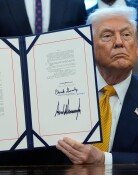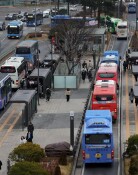As for Next Years Economy
It turns out that most domestic CEOs and economists are concerned about Koreas long-term economic recession. In addition, upon investigation it was confirmed that uneasiness about exports, the Korean economys sole cornerstone, is spreading. According to the research of the Korea Employers Federation (KEF) and the Korea CEO Forum on December 19, most CEOs are anticipating Koreas economic growth rate for next year to be lower than this years (the Bank of Koreas estimation at 4.7 percent) at a 3.0 percent level, and there were also quite a few forecasts at the 2.0 percent level.
Its Currently an Emergency Situation-
According to a recent survey, the Korea CEO Forum, which is an assembly of professional managers and academics, asked 59 members and 84 percent answered that The current situation is critical, and if an adequate solution is not proposed by next spring, a long-term depression is inevitable.
Also, the forecasted average economic growth rate for next year was 3.38 percent, and not a single member foresaw the growth rate to be above 4.0 percent. A total of 23.3 percent of the members even predicted it at the 2.0 percent level.
The most apprehensive problems for next years economy were perceived as the continued stagnation of civilian consumption and rapid cooling of economy due to the rapid decline in the construction economy (39 percent), the earnest slowdown in exports (25.4 percent), spreading non-economic instability such as the four major bills (18.6 percent). Especially, views that the four major bills underway by the ruling party were difficult to agree to and, considering the current economic situation, very inadequate, were the most numerous, amounting to 60 percent.
Economic Recovery to be Expected After 2006-
According to KEFs CEO Economic Forecast, research which surveys the CEOs of the top 100 listed companies based on sales, 81 percent of the CEO forecasted the time of economic recovery to be after 2006.
The response of recovery will be difficult for over three years was the most numerous at 36 percent, followed by the first half of 2006 (29 percent) and the second half of 2006 (16 percent).
As the economic outlook is so pessimistic, the views on investment expansion were also negative. A total of 38 percent expressed that next years investment scale would be similar to this years, 28 percent said it would be slightly cut-down, and 11 percent said they would be cut-down a great deal. Summed up, 77 percent had no plan to increase investment.
Even Exports are Uneasy-
The Export Business Survey Index (EBSI) for next years first quarter (January to March) is 90.5 according to the recent research of the trade research institute of the Korea International Trade Association, subject to 960 major domestic export companies.
This is the lowest since research was first started in 2002, and is showing a continuous downward movement since this years second quarter (April to June).
EBSI is an index indicating the export business sentiment and, if above 100, signifies that there are more companies regarding the economy of the next quarter to be better than the current, and if under 100, it signifies the opposite.
Keuk-In Bae Ki-Jeong Ko bae2150@donga.com koh@donga.com







